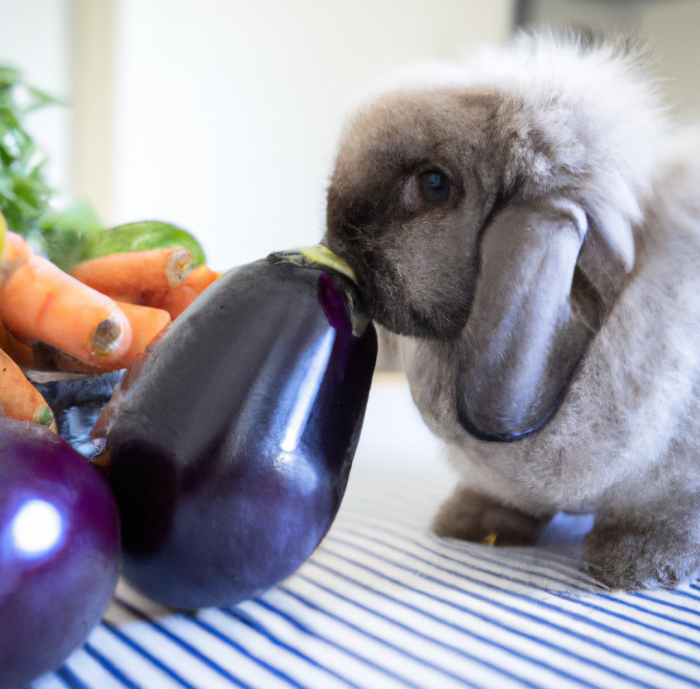Rabbits are known for their love of vegetables, but can they eat eggplant? This guide will delve into the nutritional value of eggplant, potential safety considerations, and how to prepare and serve it to your furry friend. We’ll also explore alternative vegetables that are safe and nutritious for rabbits.
Eggplant, also known as aubergine, is a nightshade vegetable that is often used in various cuisines. It’s a good source of vitamins, minerals, and antioxidants, making it a potentially healthy addition to a rabbit’s diet.
Introduction
Eggplant is a popular vegetable that is often used in various cuisines around the world. It is a member of the nightshade family, which also includes tomatoes, potatoes, and peppers. Rabbits are herbivores and their diet primarily consists of hay, fresh vegetables, and fruits.
However, it is important to ensure that the foods you offer your rabbit are safe for their consumption.
In this article, we will explore whether rabbits can eat eggplant and provide detailed information on its potential benefits and risks.
Can Rabbits Eat Eggplant?
Yes, rabbits can eat eggplant in moderation. Eggplant is not toxic to rabbits and it can provide them with essential nutrients. However, it is important to note that eggplant should only be given to rabbits as an occasional treat and not as a staple part of their diet.
Nutritional Value of Eggplant
Eggplant is a nutritious vegetable that is low in calories and fat. It is a good source of fiber, vitamins, and minerals. The following table provides the nutritional information for 1 cup of cooked eggplant:| Nutrient | Amount ||—|—|| Calories | 20 || Fat | 0g || Carbohydrates | 5g || Fiber | 3g || Protein | 1g || Vitamin C | 10mg || Potassium | 230mg || Manganese | 0.1mg
|Eggplant is a good source of antioxidants, which can help to protect cells from damage. It is also a good source of fiber, which can help to keep you feeling full and satisfied.
Potential Health Benefits of Eggplant for Rabbits
Eggplant may have several potential health benefits for rabbits, including:*
-*Improved digestion
The fiber in eggplant can help to improve digestion and prevent constipation.
-
-*Reduced inflammation
The antioxidants in eggplant may help to reduce inflammation throughout the body.
-*Weight management
The low calorie and fat content of eggplant makes it a good choice for rabbits who are trying to lose weight.
-*Improved heart health
The potassium in eggplant may help to lower blood pressure and improve heart health.
Safety Considerations
While eggplant is generally safe for rabbits to consume, it’s essential to introduce it gradually into their diet to avoid digestive issues or allergies.
The high fiber content in eggplant can cause digestive upset if rabbits consume too much, leading to diarrhea or bloating. Additionally, some rabbits may be allergic to eggplant, which can manifest as skin irritation, respiratory problems, or digestive distress.
Guidelines for Safe Introduction
- Start with Small Amounts: Introduce eggplant in small quantities, no more than a teaspoon initially, and gradually increase the amount as tolerated.
- Monitor for Allergies: Observe your rabbit closely for any signs of an allergic reaction. If you notice any adverse effects, discontinue feeding eggplant immediately and consult a veterinarian.
- Offer as a Treat: Eggplant should be considered a treat and not a staple food. Limit its consumption to a few times per week to avoid digestive issues.
Preparation and Serving Methods
Preparing eggplant for rabbits involves a few simple steps. Begin by thoroughly washing the eggplant to remove any dirt or debris. Cut off the stem and discard it. Using a sharp knife, peel the eggplant skin away from the flesh.
Cut the eggplant into bite-sized pieces, approximately 1-2 cm in size. These pieces should be small enough for rabbits to eat comfortably.
Eggplant can be served to rabbits in various ways. One option is to offer it raw. Rabbits may enjoy the crunchy texture and sweet taste of raw eggplant. Alternatively, you can cook the eggplant before serving it. Boiling or steaming the eggplant for a few minutes until it becomes soft is a suitable cooking method.
Avoid adding any seasonings or salt to the cooked eggplant, as these can be harmful to rabbits.
Another way to serve eggplant to rabbits is to mix it with other vegetables. This can add variety to their diet and encourage them to eat more vegetables. You can mix eggplant with chopped carrots, celery, or bell peppers. Ensure that the vegetables are cut into small pieces to prevent choking hazards.
Alternative Vegetables for Rabbits
In addition to eggplant, there are several other vegetables that are safe and nutritious for rabbits. These include:
- Carrots
- Celery
- Leafy greens, such as romaine lettuce, kale, and spinach
It is important to provide a variety of vegetables in a rabbit’s diet to ensure that they are getting all the nutrients they need. Vegetables should make up about 75% of a rabbit’s diet, with the remaining 25% consisting of hay and a small amount of pellets.
Final Conclusion

In conclusion, eggplant can be a nutritious and safe treat for rabbits when introduced gradually and in moderation. It’s important to monitor your rabbit for any adverse reactions and provide a variety of vegetables to ensure a balanced diet. If you have any concerns, always consult with a veterinarian for personalized advice.
Q&A
Can rabbits eat eggplant skin?
Yes, rabbits can eat eggplant skin, but it’s recommended to remove it if it’s tough or bitter.
How often can rabbits eat eggplant?
Eggplant should be given to rabbits as an occasional treat, not as a daily part of their diet.
Can baby rabbits eat eggplant?
No, baby rabbits under 12 weeks old should not be given eggplant.